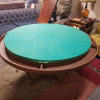Upgrade for PDF reports, more daily appraisals, and ad-free experience.
Antique Card Table
⚠️ Legal Disclaimer
This appraisal is provided for informational and educational purposes only and does not constitute a certified, licensed, or formal appraisal.
Appraisal results are generated using automated systems, including artificial intelligence, and are based solely on the information and images submitted by the user, along with publicly available data. As such, results may contain inaccuracies, omissions, or errors.
InstAppraisal does not authenticate items. No determination of authenticity, origin, materials, maker, or age should be considered verified. Many items—particularly luxury goods, watches, jewelry, coins, art, and designer products—are frequently counterfeited and may closely resemble genuine examples. Authenticity cannot be confirmed from images alone.
Any statements regarding authenticity are expressions of opinion only and should not be relied upon as fact. Independent professional authentication is strongly recommended before any purchase, sale, or valuation decision.
Appraisal values are estimates only and may vary significantly based on condition, provenance, market demand, and additional information not available at the time of review.
Appraisals must not be relied upon for insurance, legal, tax, estate, or financial purposes without independent professional verification.
InstAppraisal disclaims all liability for any losses, damages, or disputes arising from reliance on this appraisal, including transactions conducted based on the information provided.
By using this service, you acknowledge and agree that you assume all risk associated with reliance on appraisal results.












Antique Card Table (Possible Duncan Phyfe)
This is a classic card table featuring elegant detailing and carved legs, attributed to the style of Duncan Phyfe. The table appears to be made of mahogany and features reeded accents along the apron, a single pedestal base, and distinctive brass paw feet, all characteristic of Duncan Phyfe's designs. The dimensions of the table are approximately 29.5 inches high, 32 inches wide, and 16 inches deep when folded.
History and Background
Duncan Phyfe (1768–1854) was a renowned American cabinetmaker whose work defined neoclassical furniture in the early 19th century. His pieces were marked by their symmetry, proportion, and fine craftsmanship. While Duncan Phyfe himself did not mark his furniture, pieces attributed to his workshop are known for features such as lyre-shaped supports, sabre legs, and claw or paw feet.
This particular table’s design aligns with the Federal and Regency styles that were popular in the early 19th century. The craftsmanship of the piece suggests it could either be an original from the early 1800s or a reproduction made later in the 19th or early 20th century during the resurgence of Duncan Phyfe's style. The absence of maker’s marks makes it challenging to confirm authenticity without further analysis.
Condition
The table is in good condition with visible signs of wear that are consistent with its age. The wood appears to have a well-aged patina, and the detailed carvings are intact. The finish, while slightly worn, does not detract from its overall aesthetic. There is no indication of structural damage.
Current Market Value
Based on the images and details provided, the table could be valued as follows:
If this table is confirmed to be an original Duncan Phyfe, its value could be significantly higher with proper provenance. An appraisal by a professional specializing in American Federal furniture would be recommended to ascertain its authenticity.
Recommendations
This table is an exquisite example of period furniture and, regardless of its origin, holds decorative and historical value.